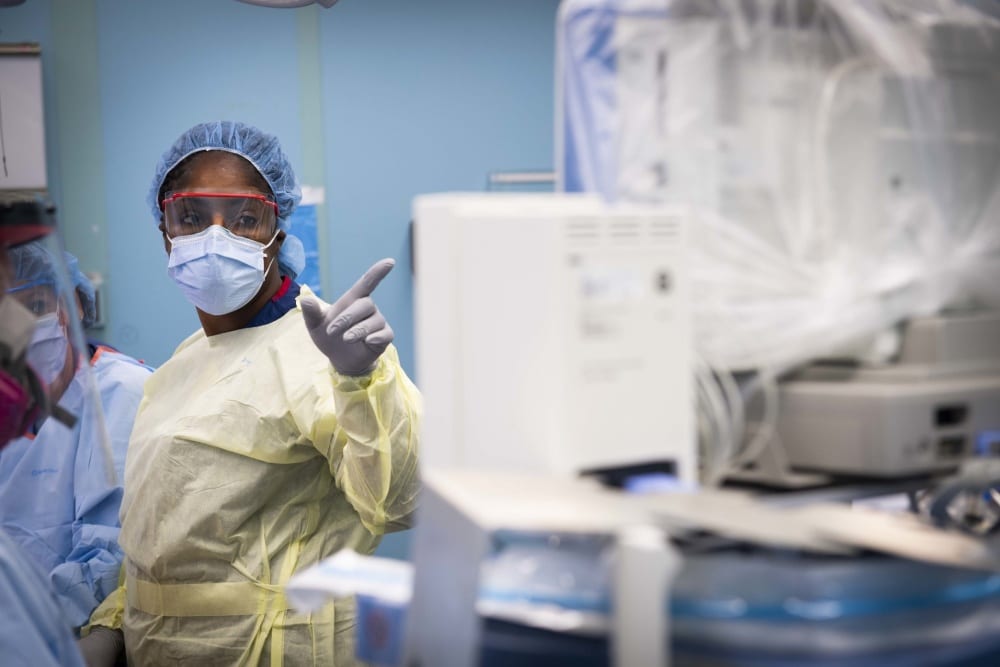In both the US and UK, health care workers are being asked to make triage decisions based on supply shortages and work outside their expertise in areas, exposing them to potential lawsuits.
The NHS could be faced with billions of pounds of medical negligence claims if it does not grant some form of emergency clinical negligence indemnity to medics risking their lives during the pandemic, the government has been warned.
Several US states including New York, New Jersey and Michigan have already adopted laws that provide healthcare professionals and hospitals with “immunity from civil liability for any injury or death alleged to have been sustained because of any acts or omissions undertaken in good faith” during the crisis.
Retired doctors have been called back to the wards and medical students sent out before they have finished training. Other treatments and surgeries are being delayed to cope with the influx of coronavirus patients.
The UK government has promised to cover the cost of any future legal actions by providing indemnities, but the union representatives say this could still cost the country vast sums and expose those who have volunteered to “extremely distressing” and potentially career-damaging hearings. With medical staff taking difficult decisions about patient care in challenging conditions, the MDU wants them to be able to work without fear they will be unfairly judged in the years to come.
Read more by Rowan Bowcott at The Guardian
On April 3, Gov. Andrew Cuomo signed legislation immunizing health care providers operating in the state of New York for medical decisions they make in the course of providing care to victims of the pandemic during the duration of the emergency that he declared on March 7.
Difficult decisions facing the frontline medical providers include when to withdraw ventilator resources or determining whether to administer aerosol-generating CPR to a COVID-19 patient, putting healthcare workers at greater risk of infection.
Groups that have long faced discrimination and lower quality health care may worry that providing blanket legal immunity could lead to further disparities in the care they receive. And the disability community is already concerned that doctors might discriminate against them, letting them die in order to help “healthier” patients.
Read more by Dr. Robert Klitzman at The New York Times
On March 27, President Donald Trump signed into law H.R. 748, the “Coronavirus Aid, Relief and Economic Security Act” (CARES Act). This new law includes Good Samaritan language that provides additional federal liability protections for volunteer health care professionals during the COVID-19 emergency response (see section 3215).
The Act contains protections for health care professionals under state and federal law for any harm caused by an act or omission of the professional in the provision of health care services as a volunteer during the public health emergency with respect to COVID-19. In order to qualify for these protections, the volunteer professional must be:
- Acting within the scope of the license, registration, or certification of the volunteer, as defined by the state of licensure, registration, or certification;
- Not exceeding the scope of license, registration, or certification of a substantially similar health professional in the state in which such act or omission occurs; and
- Acting in a good faith belief that the individual being treated is in need of health care services.
These protections do not apply if the harm was caused by an act or omission constituting willful or criminal misconduct, gross negligence, reckless misconduct, or a conscious flagrant indifference to the rights or safety of the individual harmed by the health care professional; or if the health care professional rendered the health care services under the influence (as determined pursuant to applicable State law) of alcohol or an intoxicating drug.
This section of the Act preempts the laws of a state or any political subdivision of a state to the extent that such laws are inconsistent with this section, unless those laws provide greater protection from liability.
Finally, these protections are not retroactive; they only apply to harm occurring on or after the date of enactment. They are also subject to a sunset, remaining in effect only for the length of the public health emergency declared by the DHHS Secretary.
Read more at the American Medical Association


